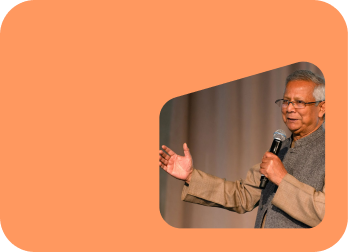Stephen Covey Interviews Grameen Bank Founder Muhammad Yunus
Stephen Covey: Welcome to Masters of Leadership. I'm Steven Covey. Join me as we talk with world leaders and others who lead the world in their pursuit of excellence in politics, the arts, science and business. Remember, leadership is the enabling art in every field of human endeavors. Masters of Leadership is a new series that presents a unique perspective on the world and its leaders.
Will everyone give genuine welcome to Muhammad Yunus from Bangladesh who runs the Grameen Bank. His life, his heart, his devotion is for the poor is a one word mission statement. That's what he's all about and it's consuming him. It would be so easy to just focus on his work, because that's what he would like us to focus on. But I want to focus on him as an individual so that you will leave with a better understanding of a leadership style that is amazingly effective; hopefully you will be inspired in your own lives to follow a similar type model. Even if you have to adapt it to your own personality, your own circumstance.
I'm going to ask some questions. But I just want to give a framework as to why we're focusing on you rather than on your program to help the poor even though that will come out as well. We're interested in how you developed this vision and what vision you have now for the future in helping the poor? How did you develop it? What encourages you? What discourages your vision? What frustrates you in terms of this vision?
Muhammad Yunus: I was trained to become an economist and I finished my work and I was teaching and did my PhD so I thought I did that. I prepared myself for that kind of road. But then I realized that I had not learned enough to solve the problem of poverty. So I distanced myself from the things that I learned and tried to learn anew about people. It's very difficult when you have learned something a certain way. Not only your mind absorbs it; your eyes also are trained to see in a certain way because eyes are only as good as you've been trained to see. So you start seeing the way you have been taught. It's very difficult to look at it in a kind of a free manner, what reality is. So that was my first struggle, to see it as it is, rather than tainted by my own previous thoughts.
Stephen Covey: It became a personal struggle inside you?
Muhammad Yunus: And then I saw a different world that I never saw before, heard before, read about before. But in trying to make myself useful, not as an economist but as a human being, distancing myself from those things was new. And responding to another human being, that was another one. I was an economist now turning into a human being—as if these are two different things. I don't know but I did that and then I had no vision.
You asked me about the vision. All I felt, if you would like to call it a kind of drive, was can I make myself useful to another person, a person who was in terrible difficulty? At that point of need I was trying to make myself useful in some way. I didn't know which way so I didn't have a preconceived notion of what I should be doing, I didn't have a plan. When you say vision you have a track that this is what I would like to say. I didn't have that. I had only immediate things today, only today, not tomorrow. I don't know what will happen tomorrow. Today I can see myself like crystal.
I got involved with [finding that people were in need. I discovered] situations where a group of 42 villagers together only needed $27. So that was an instantaneous response. I was not prepared. The only thing I felt was disgusted that I had not learned this before. That people need such a small amount of money to deal with their own daily life. Because wherever I went to school they taught me about millions of dollars. I dealt with billions of dollars in national plans and investment plans and so on. Not this tiny money, $27 for 42 people. So again I felt an instantaneous response. I'd like to take money from my pocket and free them from the loan sharks that preyed on them. Because all this money came from the moneylender—and they were taking advantage of the situation. So I had an instantaneous reaction. I didn't think of what will happen next. I have no idea because...
Stephen Covey: You didn't even think of what will happen to you next?
Muhammad Yunus: No.
Stephen Covey: Because you were just following the thing you felt was the thing to do?
Muhammad Yunus: It was the thing to do, yes. It was their response and you mention that one thing leads to another. That it is their response of excitement, getting happy! That some unexpected thing happened to them. Then I'm feeling better. Was it such an important thing I did? And that made me think if you can make so many people so happy with such a small amount of money, why shouldn't you do more of it? So another thought came to my mind. Now I didn't know if I should be going to do that. So I was struggling to figure out what I should be doing.
Then the idea came, maybe I should go to the bank. Link them up so that the bank can lend them the money whenever they need the money. If I give them another $27, then every time they have to track me down to pay me back. But, I'm a teacher. I'm on the faculty. I teach. And it's not easy for a poor person to enter the campus to track down the professor in the campus in a Bangladesh situation. They all will be stopped at the gate. You have no business in the university! So that's not easy. So I thought it should be a routine thing; a place that they can go to, get the money and go ahead with their lives.
So I thought the bank should be doing it. So I went to the bank. I didn't expect anything, I didn't know. At the beginning I thought maybe they will just take it, it's such a few dollars. But [I got] an extremely negative response: Saying that no bank can lend money to the poor people. So what I'm saying is that I was not being driven by a vision. I was trying to solve any little problem each time. And in the process I'm hitting a next problem, then I thought let me solve this one, this one looks not too difficult but I can solve it. And in the process of doing that I get a different problem, then again I try to solve that. So step-by-step I go.
I was in a state of progression. I would say if you try to look for some kind of future in what I was doing, you see I was being very stubborn, not giving up. And every time I thought it was a very reasonable thing I'm saying, people were not accepting that. And now I see what they were doing: they were working with their mindsets. Then I'm finding that knocking at their mindsets is hard work. A simple knock will not make it crawl. I was trying to push it. I was trying to find a bird's eye view where I could find a big solution. So this is what I was trying.
That is what I learned in school, what I learned in the educational part of my life. Trying to acquire a kind of a bird's eye view. You drive hard and see everything. And that's called education because now you can see everything. Then I realized in my work here that when you fly high you really don't see things very clearly. You make it up because it's such a blurred reality. You make up stories and piece them together and then you lose touch of the reality because you fly too high. What I was doing in that village was talking to these women and trying to discover his/her everyday life. I was trying to create a new kind of bird's eye view.
So that gave me also a strategy for my work. In a bird's eye view you tend to survey everything and decide on a particular point, then you swoop down and pick it up. In a worms eye view you don't have that advantage of looking at everything. You just see whatever is close to you. Then I began to see that the worm's eye view was logical, it was reasonable and it was important—that small problems must be solved because people's lives depended on all these tiny things. I was not trying to solve everything. And my initial position was very clear. But I would like to solve a tiny problem and so we fit into that goal of tiny problem.
Stephen Covey: Correct me if this isn't so, but I sense that you were almost ashamed of all of those years of going with a bird's eye view. Because this worm's eye view was so meaningful, it contributed in such a practical way to this person, or to that person and that's what really got you so excited! True?
Muhammad Yunus: Very much true. I was very frustrated because my background didn't help me. All those days that I spent very hard to learn things. Some things could be useful, but if it was not useful it became a handicap; I couldn't see clearly because my mind was leading me toward a different kind of vision of what reality is.
Stephen Covey: Like to know things at the bird's eye level and not to act is really not to know at all?
Muhammad Yunus: Exactly.
Link - http://www.simulconference.com/clients/sowf/interviews/interview7.html


 SOCIAL BUSINESS
SOCIAL BUSINESS 

 Events
Events News
News



